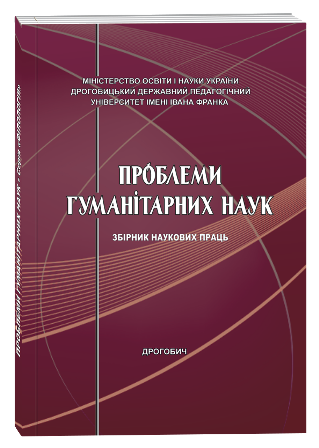PECULIAR FEATURES OF THE ENGLISH INTERNET DISCOURSE: PRAGMATIC AND SOCIOLINGUISTIC ASPECTS
DOI:
https://doi.org/10.24919/2522-4557.2019.44.194810Keywords:
Internet discourse; Internet communication; hypertext; computer-mediated communication; Internet languageAbstract
The article deals with one of the modern trends in discourse studies – the Internet discourse. The article aims to analyze the Internet discourse and systematize sociolinguistic and pragmatic factors that determine the peculiarities of the Internet language. The object of the research is the Internet discourse and the subject of the article is sociolinguistic peculiarities of the Internet discourse.
We have analyzed different interpretations of the Internet discourse by modern linguists, stating the difference between the concepts «virtual discourse», «computer discourse», «electronic discourse», «network discourse» and «Internet discourse». The ambiguous status of the Internet language has been also touched upon in our research. The language of the Internet can be attributed to a new kind of language, which plays an important role in the life of society alongside such other large language subsystems. Dealing with peculiar features in the English Internet discourse, we have outlined its goals and strategies according to a sociolinguistic approach; we can speak of the Internet discourse as a linguistic category that combines features of personally-oriented discourse.
Conclusions Modern Internet discourse is a complex system of different functional styles and forms of speech. The phenomenon of Internet communication develops so actively that it begins to affect the offline communication genre system. The developed genre system is an indicator of the dynamic paradigm formation of Internet discourse. The linguistic genres that exist in reality are undergoing various modifications in the Internet discourse, making the Internet language a true third means of communication. Internet language interpretation; the impact of the Internet language on literary English; linguistic and extra-linguistic elements of the Internet language in the communicative process can become the subjects of further investigation.
References
Винник, О.Ю. (2012). Комунікативні стратегії і тактики впливу на адресата в сучасному англомовному дискурсі програмування. (Aвтореф. дис. канд. філол. наук). Львівський національний університет імені Івана Франка, Львів.
Горошко, Е.И. (2006). Интернет-коммуникации в гендерном измерении. Вестник пермского университета «Язык – культура – цивилизация», 3, 219–299. Пермь.
Гудзь, Н.О. (2015). Інтернет-дискурс як новий тип комунікації: структура, мовне оформлення, жанрові формати. Сучасні лінгвістичні студії (с. 61–87). Жито-мир: Вид-во ЖДУ ім. І. Франка. ISBN 978-966-485-184-5.
Дедова, О.В. (2006). Лингвосемиотический анализ электронного гипертекста: (на материале русскоязычного Интернета). (Дисс. д-ра филол. наук). Взято с http://www.dissercat.com.
Дудоладова, О.В. (2008). Інтернет-дискурс як особливий тип дискурсу. Вісник Хар-ківського національного університету ім. В.Н. Каразіна, 837, 74–78. Харків.
Ильина, И.А. (2009). Проблемы изучения и восприятия гипертекста в мультиме-дийной среде интернет. (Автореф. канд. филол. наук). Взято с www.ipk.ru.
Калініна, К.В. (2013). Особливості функціонування комп’ютерного дискурсу. Обрії сучасної лінгвістики, 4, 62–64. Луганськ.
Компанцева, Л.Ф. (2005). Проблема виртуального жанра. Ученые записки Таври-ческого Национального Университета им. В.И. Вернадского. Серия «Филология», 18 (57), 2, 18–22. Симферополь.
Компанцева, Л.Ф. (2007). Інтернет-комунікація: когнітивно-прагматичний та лінгво-культурологічний аспекти. (Автореф. д-ра філол. наук). Інститут мовознавства імені О.О. Потебні, Київ.
Компанцева, Л.Ф. (2018). Психолінгвістичний опис технологічного дискурсу нових медіа. Psycholinguistics, 23 (2), 120–131. Взято з http://nbuv.gov.ua/UJRN/psling _2018_23_2_11.
Лутовинова, О.В. (2009). Лингвокультурологические характеристики виртуального дискурса. Волгоград: Перемена.
Шевченко, І.С. та ін. (2005). Дискурс як когнітивно-комунікативний феномен. Харків: Константа.
Askehave, I., & Nielsen, A.E. (2005). What are the Characteristics of Digital Genres? – Genre Theory from a Multi-modal Perspective. Proceedings of the 38th Hawaii International Conferences on System Sciences.
Boardman, M. (2004). The Language of Websites. New York: Routledge.
Crowston, K., & Williams, M. (2000). Reproduced and Emergent Genres of Commu-nication on the World Wide Web. The Information Society, 16 (3), 201–215.
Crystal, D. (2001). Language and the Internet. Cambridge University Press.
Herring, S. (2010). Computer-Mediated Conversation: Introduction and Overview. Language@ Internet, 7. Retrieved from http://www.languageatinternet.de/articles/2010/2801/in dex_htm.



